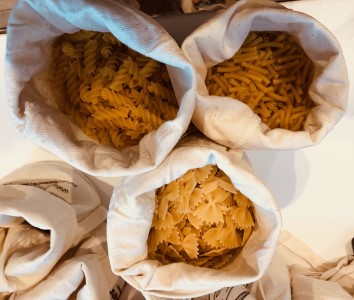Our first blog post on zero waste explained the theory and the need for it... Not read yet? Now is a good time to take a look!
Now it's time to get down to the practicalities. Where to do your zero waste shopping? How do we shop in zero waste mode? What do we need in particular? What do we need to pay attention to?
In a simple way, I will try to show you that it is possible to do your food shopping in an ecological, sustainable and especially waste-free way!
As for the purchase of more occasional products such as clothes, furniture, etc., this will be the subject of a future blog.
To avoid frustration, the following tips are designed to significantly reduce the amount of waste generated by shopping. I will therefore focus here on the subject of disposable packaging that clutters the bins every time we return from shopping and throughout the week.
Where to go for zero waste shopping?
Zero waste shopping can be done in many places. The idea is to take your bags and containers to your usual shops, to physical bulk shops, to the local market, to the farm or to do your zero waste shopping on the internet.
Zero waste shopping on the internet
Shopping on the internet
The option of buying online may seem surprising but it saves time, allows you to shop at any time of the day or night, to have the containers that need filling in front of you, to take the time to read the product information from your sofa and even to compare prices. It's a good way to avoid multiple trips, with shopping arriving at home with the postman at the same time as the mail or being picked up at a collection point when possible. How magical is that!
In addition, the carbon impact of online shopping is often decried but is far from being so negative, but that is for another blog.
Newly, it is now possible to buy online in returnable packaging. This type of purchase is, for example, possible on the website of kissplanet.shop. In this way, only the contents of the returnable packaging are counted, no preparation costs and full recovery of the deposit costs. Another step towards absolute zero waste, the deposit system being the best solution for the future, just behind "refuse" and before "recycle".
Zero waste shopping in my supermarket
More and more supermarkets are offering bulk products, which can be a good idea to start your transition to zero waste and to develop new habits. It is true that these companies lack transparency, the greenwashing practiced by some brands will be explained in a future blog.
It is easy to use bulk bags in the fruit and vegetable section for a good part of the products, but it will be non-organic because the organic produce is packaged (to avoid contamination by non-organic produce). The use of jars is authorised in the various "cut-up" departments (fish, delicatessen, butchery, etc.).
You can shop in an organic shop. Many chains of shops offer organic food and bulk bags and personal containers are allowed and even recommended in most of them. This is organic, so the budget required is higher. Except for Bioplanet (in Belgium), they all offer a combination of bulk and packaged goods.
Shopping in bulk shops
Shops offering only bulk products are developing more and more, and going there is a pleasure if you have time to spare...
Other alternatives
At the market, you can find all the fresh products and your container is always welcome. You will not find all the dry products there, but regional products are often present.
La Ruche qui dit oui, farms, etc. allow you to buy local products and vegetable baskets.
Some farms offer pick-your-own, which can be an activity to share with children, so don't hesitate to ask around and check your local newspapers.
And depending on time and desire, combining the different destinations can help to discover and vary the quality and types of food.
How can you do your shopping without producing waste, i.e. without disposable packaging?
Unlike shopping with disposable packaging, zero waste shopping requires some preparation, organisation and logistics before embarking on the adventure.
In fact, shopping in bulk allocates time differently than when you shop with packages.
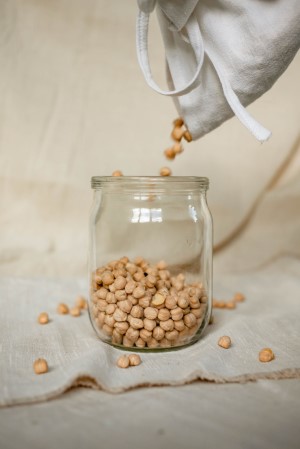
More time
Once in the shop of your choice, you spend time taring your jars and bags, you fill them yourself and the time at the checkout is significantly longer.
When you get home, it is sometimes necessary to empty your bags into containers, for some groceries in bulk bags (you can leave the vegetables and fruit in the bags if it is easier for you).
It is also necessary to wash and iron bulk bags. One trick is to dedicate bags to avoid having to wash them each time (potato bags, onion bags, bags for pasta, rice, bags for snacks etc).
Saving time
To save time, your jars already filled in the shop are stored directly on the shelves and in the cupboards. Jars filled by the cheesemonger, butcher or fishmonger are stored directly in the refrigerator or freezer.
In use, there is nothing to unpack, no disposable packaging to sort and throw away, and the benefit is better food stock management (all visible at a glance in the jars and other containers).
And at the end of the day, let's not forget the time saved by not having to take out the garbage every week. So no more chores with the rubbish!
This way of proceeding requires a change of method and habits, it is true. You shouldn't go in blindly, a test with a few bags during the next shopping trip can give you confidence for the future.
What I can share with you is that the pride, the feeling of doing the right thing and the ease of the concept give me immense satisfaction every week. In addition, at the end of the day I save money with the menu and avoid unnecessary storage and throwing away when I have bought too much.
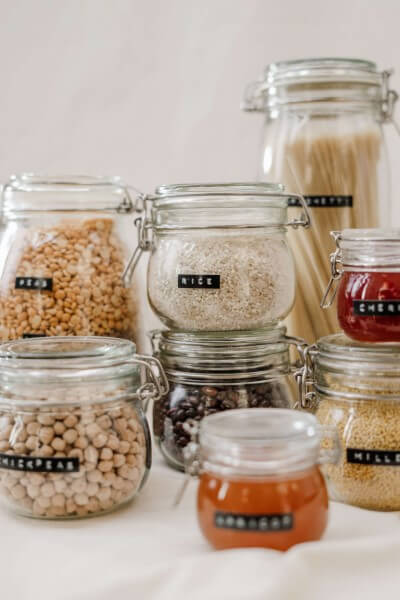
The preparation and logistics of zero waste shopping...
There is no real preparation per se for zero-waste shopping, but rather some good practices that can help make shopping 100% zero-waste.
Here are three essential tips for preparing your zero waste shopping:
1) Make a list of what is being emptied as you go along, which will help in deciding on the number of bags and containers needed for shopping.
2) Draw up a menu for the week and note down the ingredients needed for the planned recipes. This will avoid wastage, allow you to buy only the quantities you need, avoid compulsive shopping, avoid forgetting anything and stop stockpiling with the risk of wastage.
Taking the time to make a menu to cook yourself will avoid buying prepared or processed products that are often (over)packaged. Besides being good for the environment, cooking your own food is good for your taste buds and your health!
3) Optimise trips. Think about the sequence of trips, the need to make a trip only to buy one product and the best time to go to your shopkeeper. For example, I have to go to the grocer, the fishmonger and the baker, I finish with the fishmonger, the fish will thank me😉.
Essential equipment for zero waste shopping
First of all, the basis is to have a solid reusable bag, the best being to favour what you already have at home. No bag yet? Then choose a hard-bottomed, reinforced tote bag made of strong, durable fabric rather than plastic. An excellent option is a wide, high wicker basket or a trolley (it's coming back into fashion and doesn't break the back). Hard bottoms are particularly useful for carrying jars, which stay upright.
Next, get a set of cloth bags of different sizes for loose vegetables or bread, for example. These are easily available in shops, but with a few basic sewing skills, it is very easy to make your own in any size (old pillowcases are easy to turn into bulk bags).
Finally, bring a few jars, one or more egg cartons and glass bottles depending on the shopping list (oil, vinegar).
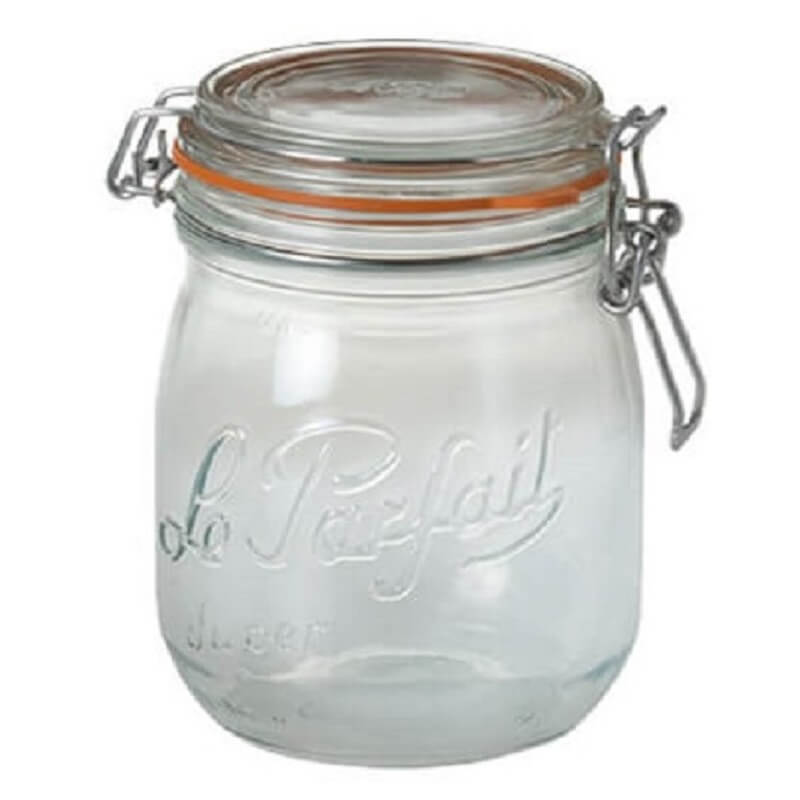
Most of the above is to be found at home or in the family circle. Sometimes there are treasures in the cellar, attic or in the back of family members' cupboards. It also helps to keep jars of all sizes of canned goods and especially to think about reusing what is in our cupboards, such as Tupperware containers for example. With practice, it becomes easier to choose the right size of container according to the shopping list. Getting smart and creative is part of the zero waste transition!
Favour local and seasonal products
Zero waste is mainly about avoiding disposable packaging, but it is also important to think about where the food comes from, how it is made, by whom, etc. Buying a product without packaging that has travelled 5,000 km may not make much sense.
Favouring local and seasonal products as much as possible is not easy, but it is worth trying, step by step, to find out about one type of product and then another. The nearby farm may have wonderful vegetable baskets, for example, or you can go to the local market and look for local producers and why not become a loyal customer. In spring, when the weather turns nice, the urge to buy strawberries from Spain may take hold of us..., resisting and waiting for the good strawberries from home is a much better solution. It is not a question of depriving ourselves but of consuming better...
Buying in bulk is very easy when you go to the market, the zero waste experience is only made easier if you don't let yourself be tempted by fruit and vegetables from far away. Taking the time to compare and ask the grocer can teach us a lot and surprise us.
Shopping in small local shops makes it easier to avoid the temptation to buy products that are not in season or that come from too far away. Another idea is to hang up a calendar with seasonal fruit and vegetables in your kitchen and keep it close by when you make your meal list.
How do I go about it with my retailers?
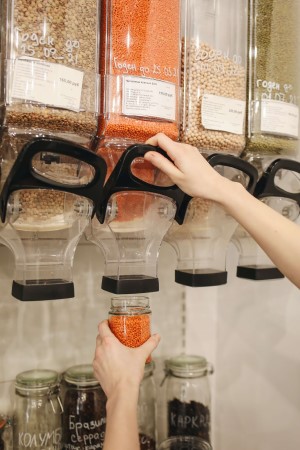
In bulk shops, it's quite simple, there are scales that allow you to weigh the ingredients. Just take your jar or bulk bags, tare them (so you don't have to pay for the weight of the bags/jars) and stick the label on the container. Then fill the jars or bag, weigh them and stick the label on.
In other shops or in a regular supermarket, start by asking with a big smile if it is possible to fill our own containers and remember to tare the container first. The vast majority of cutters (butchers, delicatessens, cheesemongers, etc.) are happy to cooperate, but some refuse, hiding behind unfounded regulations and instructions (this will be detailed below).
Quite simple, isn't it?
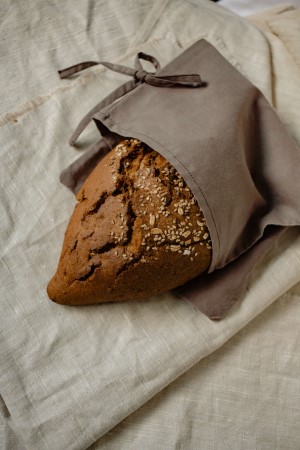
Are there any products that do not exist in a zero waste version?
So yes, not everything exists without packaging, powdered ingredients like cocoa, carob powder, flour, or jams and spreads are complicated to pack in our containers. And also ready-made pizzas at 1 euro from the supermarket for example, but I tend to think that it's not so bad: making homemade pizzas is great! I like to think that eating what you want in a zero waste version is possible and better for your health!
If a product is really not available in bulk or if it is necessary to travel many kilometres to obtain it, it is worth considering and favouring recyclable packaging such as cardboard for example. Banning single-use plastic altogether, which pollutes our planet in particular, is the right attitude. One solution is to find recipes on the internet to make that dream dish yourself, it's cheaper, fun and healthier😊.
Let's think for a moment about the meaning of the word "bulk" and agree that it is indeed the zero waste version of the product: i.e. no disposable packaging, one uses one's own reusable packaging or the shop's deposit-refund packaging. It is not a question of filling up a bulk shop with single-use bags provided by the shop, even if they are made of paper!
Apart from shopping, if I want to go for a zero-waste " French fry ", is it possible?
In theory yes! Most shopkeepers are more and more open to the idea of filling our containers, we just have to take the plunge and dare to ask, in the end it's a good deed for everyone and the only risk of asking is to get a no, that is to say the same thing as if we hadn't asked.
What about Belgium ? It still happens that some retailers hide behind the ready-made phrase "we are not allowed because of the FASFC" or any other kind of reflection containing the scary "FASFC". And yet, it seems to be misinformation or bad will:
"The FASFC is 100% "for" zero waste, as long as the practice remains in line with the law and does not entail any risk for the consumer. Food legislation has never forbidden consumers to bring their own packaging to take away the purchases they make in a shop. Thus, the FASFC has been answering "yes" for a very long time to questions from professionals and consumers asking whether such a practice is allowed. "*
Of course, there are requirements, common sense in fact:
- The container must be clean.
- It must be suitable for food packaging (a plastic bag received when buying shoes is not suitable, nor is the plastic can that contained washing-up liquid...).
- Appropriate packaging bears the European logo of a glass and a fork.
- Acidic food cannot be carried in an aluminium container (risk of chemical reaction).
In France, an anti-waste law was even passed on 10 February 2020, which states: "any end consumer may ask to be served in a container brought by them, provided that it is visibly clean and suitable for the nature of the product purchased. A display in the shop informs the final consumer about the rules for cleaning and suitability of reusable containers. In this case, the consumer is responsible for the hygiene and suitability of the container. The retailer may refuse the service if the container offered is obviously dirty or unsuitable" (Article L. 120-2 of the Consumer Code).
So there is no reason not to ask the shopkeeper!
To go further...
Read our other blogs on zero-waste: Sober and coherent living by adopting a zero-waste lifestyle, solid shampoo, good zero-waste coffee in a stylish coffee maker, period panties, "household" vinegar: a cheap and inexhaustible cleaning product and many more!
There are also many books on zero waste such as Bea Johnson's "Zero Waste Home: The Ultimate Guide to Simplifying Your Life by Reducing Your Waste" or Marie Cochard's "Les Épluchures" and "Notre aventure sans frigo" etc. This gives you more tips on how to continue your own journey towards eliminating your rubbish.
To conclude...
Zero waste is not an attitude that can be adopted overnight. That's why, in the form of blog articles, we're trying to break it down into several themes, so that you can go step by step. Go gradually according to your motivations and desires. I like to think that every gesture counts and that it is better to have thousands of people trying zero waste in an imperfect way, than a handful of people doing it perfectly. Every gesture counts, every piece of packaging avoided counts and the satisfaction you get from it will make you happy.
Titi the Elk


